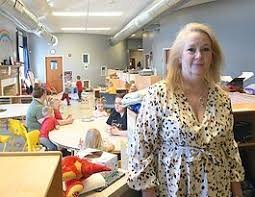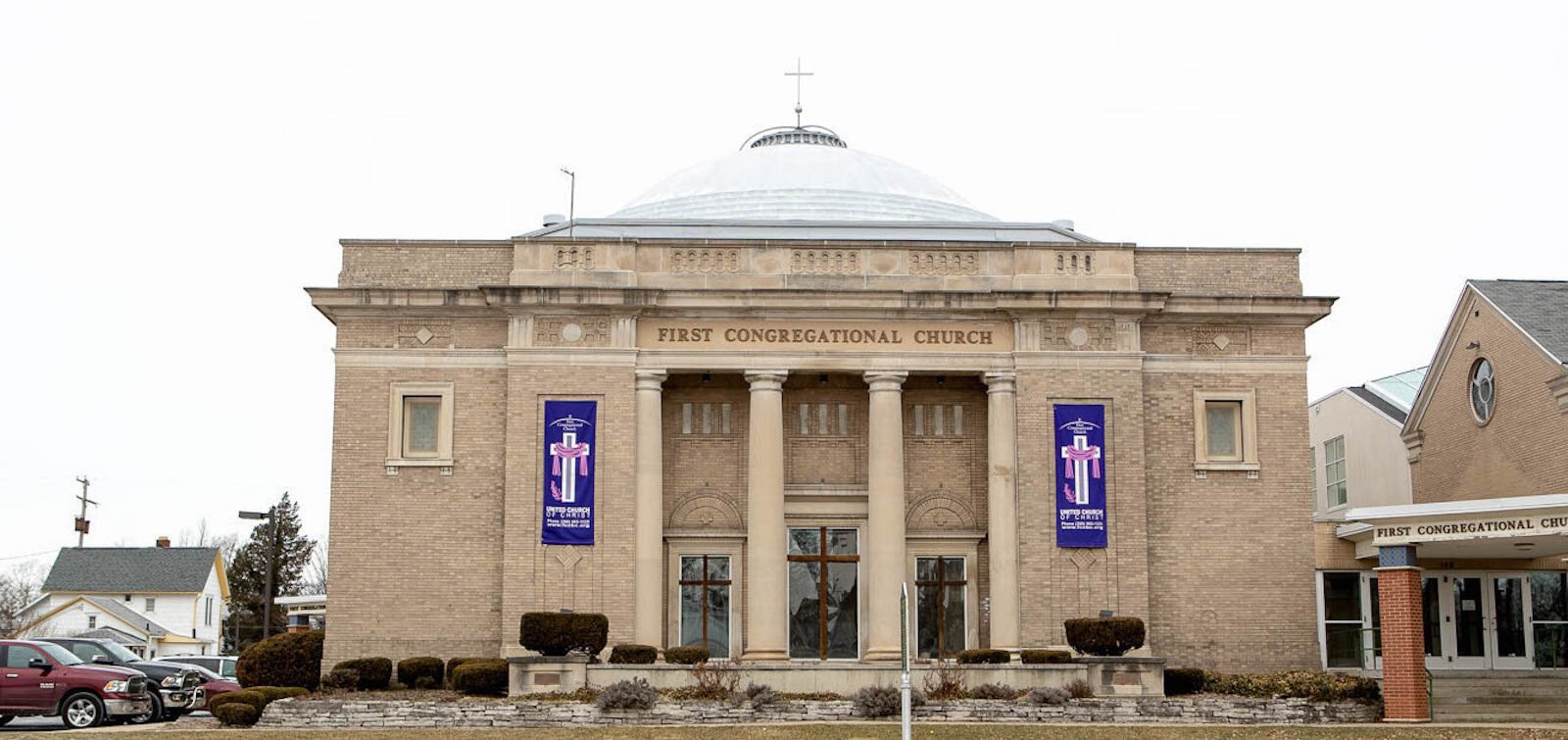BC’s Early Childhood Education poised to flourish — and save a church at the same time
“The preschool is one of the most important and vital options at the church. It has a waiting list that continues to expand. One possible future option is that Garden of Dreams would expand to occupy more of our building or an additional childcare center could come in here.”
Editor’s note: This story is part of Southwest Michigan Second Wave’s On the Ground Battle Creek series.
In a perfect world all young children would have access to Early Childhood Education (ECE) opportunities that would serve as the foundation for their future success as adults, says Robin Beasley, Director of the Garden of Dreams (GOD) Pre-School in Battle Creek.
The reality, Beasley says, is that “demand for quality, affordable ECE and childcare in general is far outweighing the supply of available slots nationwide and Battle Creek is not immune.”
“We are licensed for 83 children, six weeks to five years old, and we have a waiting list that continues to grow,” she says, of the preschool which opened in 2005 and she has led since 2020.

Robin Beasley, Director of the Garden of Dreams (GOD) Pre-School in Battle Creek.
An ECE Analysis done by IFF, a Chicago-based organization with offices in Grand Rapids and Detroit, supports Beasley’s thoughts. Their research concluded that there is an insufficient supply of ECE provider slots in Battle Creek to meet family needs resulting in a shortage of 2,391 slots for children ages 0 to 5. The unmet need for ages 0 to 2 is the highest, making up 1,522 slots of the gap.
IFF, according to its website, “Champions nonprofits across the Midwest to shape more equitable and vibrant communities through community-centered lending, development, and real estate solutions.”
Through a grant from the W.K. Kellogg Foundation, representatives with IFF will be focusing their efforts on supporting the expansion of new or existing childcare homes and centers in Battle Creek, says Megan Russell Johnson, Program Officer with WKKF.
“We made the grant because we really want our local partners in Battle Creek to be prepared to serve more children and take advantage of any state dollars that might become available,” Russell Johnson says of the two-year $175,800 grant.
That state funding includes dollars made available through the Caring for MI Future initiative, a $100 million investment “that will help more Michigan families find quality, affordable child care in their community by opening 1,000 new, or expanded, child care programs by the end of 2024.”
New applications for this money have since been paused “due to the incredible level of interest and applications in the first six months,” according to information on the Caring for MI Future Facilities Improvement Fund website.

Megan Russell Johnson, Program Officer with WKKF.
In addition to addressing the needs of families with children 0-5, Gov. Gretchen Whitmer had an initial goal to secure free preschool for all four-year-olds by the end of 2026, but her most recent budget proposal shortened that timeline to the end of this year. This will be accomplished by investing an additional $159.5 million into that effort, including $63.5 million to enroll nearly 7,000 additional students in the Great Start Readiness Program (GSRP) and $35 million to create and support classrooms in underserved communities.
“We want to ensure that people in Battle Creek who serve children with the greatest needs will be ready,” Russell Johnson says. “It really is core to what we do at WKKF and tied to our mission of making sure all children are happy, healthy, and thriving which was very important to our founder, W.K. Kellogg.”
Located in the core of the city’s downtown area, 76 percent of the children served by Garden of Dreams are from low-income families. All of their tuition is paid for through funds from the Michigan Department of Health and Human Services (MDHHS), Beasley says.
The preschool is one of six that will be working with IFF on feasibility studies.
“The feasibility study will look at what re-purposing this property could look like and expansion of our current space. There are so many rooms in this building that are perfect for additional classrooms. We could be contracting with CAA (Community Action Agency) or the ISD (Calhoun County Intermediate School District) to fill some of their early childhood education needs,” Beasley says.
Discussions between WKKF and IFF began when facilities were included in Caring for MI Futures, Russell Johnson says.
“We have early childhood partners who meet on a monthly basis to see how they could be ready to take advantage of this now or in the future,” she says. “All of the early childhood leaders on a recent call said they could really benefit and that prompted WKKF support.”
Beasley says she connected with IFF when she wanted to look at the possibility of re-opening a childcare center — Altrusa Daycare — which closed its doors in 2023 after its director passed away. She says staff had 48 hours to notify the families of the children they were caring for before shutting down.
Some of those families sought space at Garden of Dreams which has contributed to that waiting list.
Altrusa was housed in what’s known as the Valentine Building owned by the city. IFF is now working with Pulse, a partner, advocate, and coach improving early childhood development in Michigan, to locate a new childcare center there.
“I let (IFF) know what was going on here at the church,” Beasley says.
Retaining a childcare center and a church
For the past few years, FCCBC has been engaging with different organizations to discern ways to keep the 124-year-old building housing the church or more recent discussions involving the sale of the building.
During a meeting after the regular service on Sunday, members of the Congregation, about 60 in all, met with FCCBC Pastor Nate Craddock and representatives with the FCC Church Council to discuss the latest developments, including the one involving Garden of Dreams.
“The preschool is one of the most important and vital options at the church,” Craddock says. “It has a waiting list that continues to expand. One possible future option is that Garden of Dreams would expand to occupy more of our building or an additional childcare center could come in here.”
If the building is developed to expand the preschool’s current footprint, Craddock says the children who attend would remain and there would be no disruptions to the lives of them or their parents.

If the building was to be sold, current tenants, including the preschool and the Arts and Culture Collective of Battle Creek (ACCBC), would be faced with possible relocation.
Under this scenario, Beasley says she would be looking at displacing 83 children, many of whom would not have access to other providers given the slot shortfalls.
Craddock says the partnership with IFF is good news for the church, which like houses of worship throughout the United States, is working through ways to serve dwindling member numbers while remaining in their current location — or considering other options. He says he’s speaking publicly about this because of rumors swirling in the community about the fate of FCCBC.
“This is the changing face of religion in America,” he says. “In our case, maintenance fees are outstripping our capacity to keep up with maintaining the building’s structural integrity.” He adds, “This is not the case for all churches and some churches are doing very well.”
IFF can offer loans that would cover up to 95 percent of the work that would be required to make repairs to the building. The preschool could become the owner of the building and the fiduciary for the loan.
“If (IFF) becomes a financial lender they will be looking at what the possibility of paying them back,” Beasley says.
There is unused space at FCCBC to accommodate nonprofits in the community who require office space, Beasley says. There also is a commercial kitchen on-site that provides catering for private and community functions at the church as well as outside of the church, and there is a courtyard area that also is rented out.
This gives her faith in the ability to pay back any possible loans.
“Everything’s on the table,” Craddock says. “The deciding factor is the outcome of the feasibility study which is expected to be completed in 14 to 16 weeks. At the same time, we’ll also get a valuation of the building as a real estate asset.”
Depending on the outcome of the feasibility study, the church’s footprint would decrease.
“The congregation is going to be fine whether we stay in this building or leave. It’s not good stewardship to be paying $500,000 a year to maintain a building. In the next 20 years, there are going to be thousands of stories like ours. This is the reality we’re living in. Our faith is centered in resurrection. You’ve got to die first to be raised. Even if this form of church dies it will be raised in a new way.”
The additional space created by the church’s smaller footprint could be rented out to other nonprofits that are in line with its mission with current tenants like the pre-school and the ACCBC who will remain with opportunities to expand.
Beasley says one of her dreams is to collaborate with the ACCBC to create a preschool as a magnet school for the arts and music.
“This is a historical building with so much to offer,” she says. “Somehow we’ve got to get the community rallying around things like this. How do we continue to support historic buildings and keep them from being one more empty space?”
While she considers the IFF opportunity to be a “validation of our work, the kids we serve, and the lives we touch,” she also says, “If we walk away from it, it’s four years of what I consider to be wasted time, especially knowing that there’s still more we can do.”















